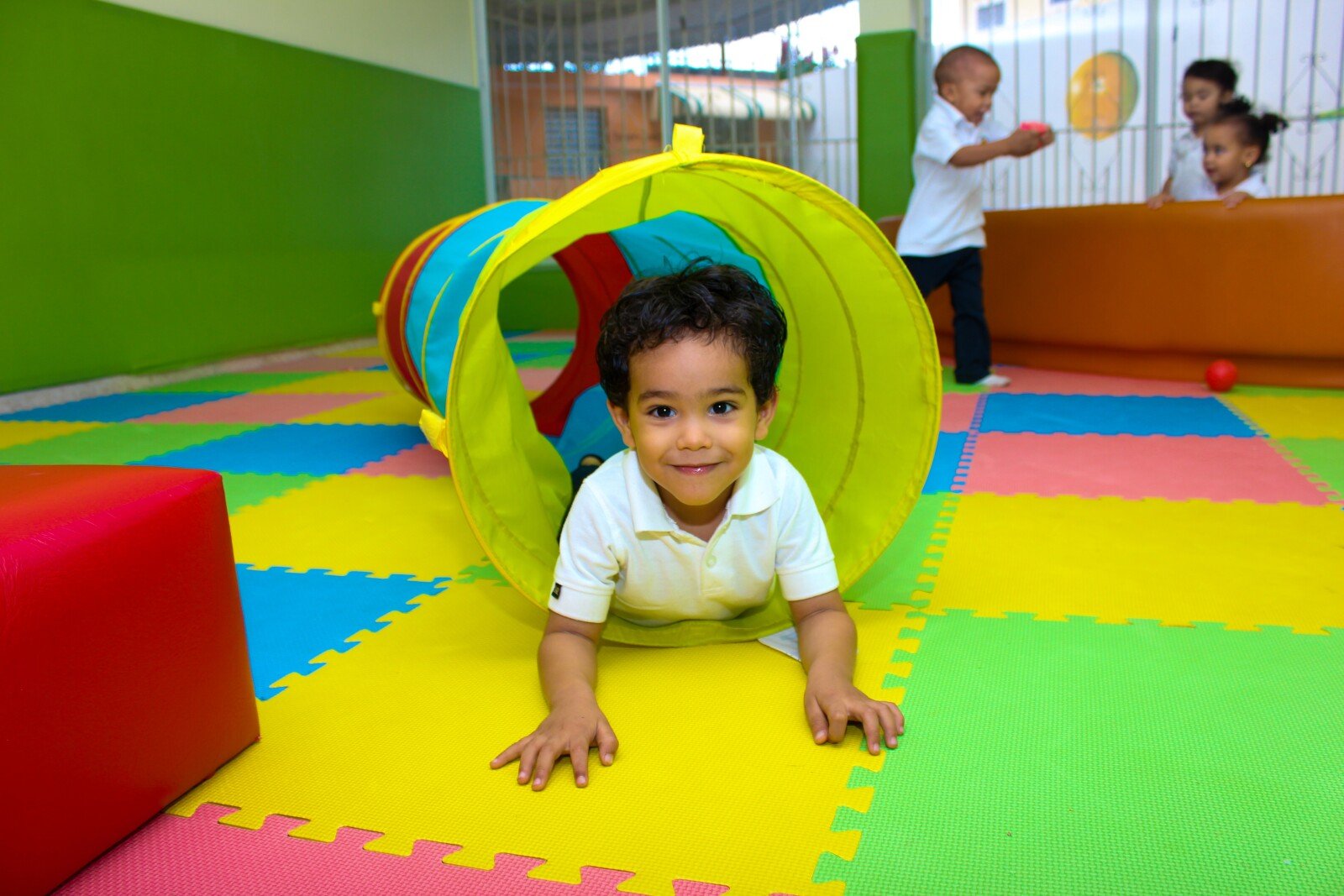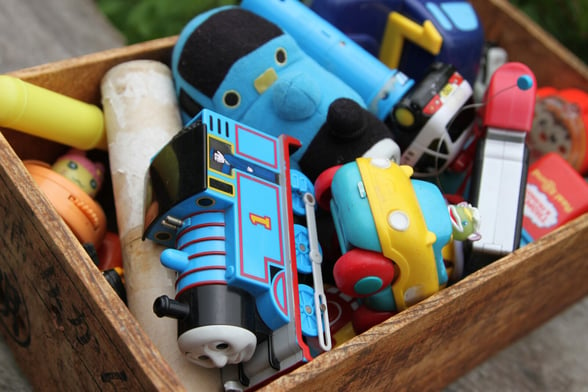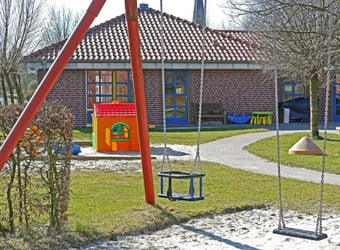
Interviewing potential candidates for your daycare can be time-consuming, so it helps to have a set of daycare interview questions prepared in advance. Use this guide to help you with child care interview preparation, so you can ask pertinent and thought-provoking questions for candidates that will help you get a sense of their skills, personality and ability to handle new situations. This list of daycare interview questions and answers are grouped by topic – work experience, daycare-specific topics and soft skills – to help you learn about each applicant. Sample answers for child care interview questions are provided to help you gauge each applicant’s capabilities.
Table of Contents
Work Experience Questions
The first daycare job interview tip is to dive into an applicant's background and education to determine if they have the knowledge and personality to be a good fit for your organization. While everyone has to start somewhere and get their first job in the field, you want to gauge if they're adequately prepared to work in child care.
1. What Experience Do You Have Working With Young Children?
One of the top daycare interview questions we recommend asking is about the interviewee's experience working with young children. This question is perfect for determining whether the individual has the right skill set to oversee and teach children.
One follow-up question you can ask with this one is what age group of kids they have the most experience working with. You want to ensure they're comfortable interacting with children in the age range at your daycare.
An acceptable answer might be the interviewee saying they've worked as a teacher's aide in a local preschool for the previous four years. They might also mention that they dealt mostly with kids between three and five.
2. What Education and Certificates Do You Have?
Having certificates and degrees can show you how committed a person is to becoming a child care provider. Various certification programs teach a wide range of things, including the latest in child care and safety protocols. Your agency might require all workers to have certain certificates, like CPR or first aid.
Some certificates a daycare worker can pursue include:
- Child Development Associate (CDA) certificate
- Early Childhood Education (EDE) certificate
- Water safety
- Advanced child care training
- Newborn Care Specialist Association
While these certificates might not be required in your organization, they can set applicants apart from the rest. The education they possess shows you that they're committed to working with children and can bring value to your daycare.
3. What Would You Change in Your Last Job?
This is a top daycare interview question. Most people also likely get this question during interviews for other types of jobs outside of the child care field. It can be a covert question that can tell you a lot about what the applicant expects when working at your facility.
Interviewees shouldn't openly criticize their previous employers during their answers. They can bring up ideas on what they thought should be changed at their previous jobs if it's presented constructively. They could discuss that their jobs didn't have a lot of opportunities to move up the ladder and grow their careers.
4. Why Are You Leaving Your Job?
Your applicant might not be leaving their current job and looking for a new one. Perhaps they're freshly out of school and looking for their first opportunity to work as a child care provider.
However, this question for a child care provider will let you know if they're a loyal employee. They could talk about how they want to move on from the current daycare they're working at. Maybe their current role doesn't have any room for advancement and they want to grow their skills.
Keep in mind that the applicant shouldn't speak poorly about their former or current employer during this section of the interview. It might be a red flag if they use this as a chance to talk about how their boss didn't treat them right.
5. What Are Five Words That Describe You?
A person's answers to this question will give you a good indication of what they think their attributes, qualities and strengths are. Candidates will typically highlight what they consider their most important traits. You can get a better understanding of how self-aware they are and what positive things they believe they can bring to your organization.
6. What Is One of Your Weaknesses?
This is another common daycare teacher interview question. It helps show how self-aware a person is. Not only should they highlight an area they can improve, but they should also talk about the steps they're taking to turn their weakness into a strength.
Some of the elements they should include in their response are:
- Specific weakness
- How the weakness can affect their position
- Ways they're attempting to mitigate or overcome it
You can use the answer to get better insight into how they try to solve problems and to see how determined they are to become a better team member.
7. Why Are You Perfect for This Position?
This is another classic daycare interview question a daycare manager can ask during an interview. This isn't a trick question that sets an interviewee up to answer the “wrong” way. You want to hear a genuine response from the applicant on why they'd be a great asset to your daycare.
Some things they should highlight in their answer are how their experiences and traits match the specific things you included in the job description. It shows they took the time to understand what you're looking for in your new hire. You can also see how their background can effectively match what your daycare needs.
8. What Do You Want from Your Next Job?
This question will show you how the applicant thought this role would fit in their life. It'll also illustrate what they're looking for from their career and their long-term goals.
Some of the things applicants might mention in their responses include:
- Their beliefs and passions
- Why they're in the child care field
- Opportunities they want from their careers
Be wary of any candidate who mentions benefits or salary in their response. This isn't the time to discuss those topics.
9. Why Do You Want to Work Here?
An applicant's response to this daycare teacher interview question will illustrate if they took the time to learn about your organization. Candidates need to do more than read the blurb about your daycare that's listed in your job posting. A person who's serious about this position and working for you will do additional research.
A solid answer will pinpoint specific elements of your daycare from places other than the job listing, such as your website or social media pages. The interviewee can refer to your organization's mission in their response and how it ties into their philosophies about child care.
10. How Do You Define Success?
This question should focus on how a candidate defines success regarding a child's developmental progress. It can include:
- Basic cognitive abilities
- Social skills
- Hitting milestones in language progressions
- Establishing meaningful relationships with children
Their answer to this daycare interview question will demonstrate if they understand what it takes to be successful as a child care provider.
11. What Are Your Interests?
The goal of this question is to learn more about a candidate's extracurricular hobbies and interests. You can glean more information about their lives outside of professional and academic settings. You can see how well-rounded they are and what additional things they can bring to your daycare.
Your workers are in no way obligated to share their personal lives with you and their colleagues. However, it's something you need to be sensitive about when working with children, especially when so much of people's lives are shared on social media. The last thing you want to happen is for a concerned parent to share something they discovered about one of your workers on the internet.
This daycare interview question and answer can help you see how compatible they are with your organization. You likely have workers and students from a wide range of backgrounds. You want to determine if they can fit in with your current team, which values diverse experiences and interests.
12. How Do You Talk to Your Peers About New Topics?
How a worker engages with their colleagues is another important facet of their job, and an important preschool teacher hiring question. You want someone who is a team player and can effectively communicate with their coworkers. This question not only gauges their communication skills but how they deal with others.
Ask them about a situation where they had to introduce a new topic to their coworkers. This can include a new teaching method or activity they want to introduce.
Sometimes we have to explain things to others who don't have the same level of understanding that we do. Their answer to this question will show you if they have the skills to effectively communicate information in a way everyone can understand. You can also determine if they talk down to others who aren't familiar with something they are.
13. Describe a Time When the Results of a Situation Went Against What You Expected.
Owning a daycare means you understand how kids can make your workday unpredictable. You might have an idea for what you believe to be an engaging and exciting activity, only for it to blow up in your face.
A person's answer to this question will tell you how they adapt to unexpected situations. You want to learn how sudden change or disappointment affects their ability to perform their duties.
A good response to this question would include a time when they tried to have their students try something new. They could talk about how what they expected to happen didn't occur, but how they didn't let that affect them. Another thing they could discuss is what they learned from the situation.
- Have You Ever Needed to Make a Decision Without Managerial Supervision? [h3]
A manager or supervisor might not always be on-site during the workday. You want to have a team of employees who feel confident making decisions for your daycare and the students under their supervision.
Some of the scenarios where they might have to quickly make a decision include:
- Conflict between peers
- Issues with a parent
- Change of curriculum
Having the confidence to make smart, educated decisions is an important quality for daycare workers.
Specific Daycare Interview Questions

These types of daycare teacher interview questions are intended to see how an applicant would act in specific scenarios in your facility. Using this type of early childhood educator interview query can help you get a better idea of how their brain works and if they can think on their toes.
15. Why Do You Love Working With Children?
This question is designed to get to the heart of what motivates your potential new hire to work with children. Discovering their favorite part of being a child care provider authenticates why they're doing what they do. If they're unable to come up with an adequate answer to this question, they might not be a good fit for your organization.
Some of the things they should highlight in their answers include:
- The opportunity to help children see their abilities and potential
- The chance to bring kids joy
- Being able to educate children
- How rewarding it is to assist kids during their formative years
This question helps give you insight into if the person has a lifelong passion for working in the education field.
16. What Do You Like Least About Working in Child Care?
This question isn't intended to be an opportunity for the interviewee to list their grievances about working in the child care industry. It's a cleverly worded question whose goal is to give the applicant the chance to highlight some of the personal challenges they have operating in the field. These obstacles might have more to do with their weaknesses than they do with their students.
Your interviewee should use this question as a chance to show you how self-aware they are. The shortcomings or difficulties they encounter working in a daycare will give you insight into whether these situations will prevent them from being a good employee.
A satisfactory answer might include the following elements:
- I'm a naturally introverted and shy person.
- Due to this quality, I find it challenging to speak up in group situations, especially with rambunctious kids.
- I've been working on building my confidence and public speaking skills.
17. What Type of Activity Would You Do With a Group of Two-Year-Olds?
You can restructure this question based on the ages of the kids in your daycare facility. The goal of this question is to determine if the applicant knows what kinds of activities are appropriate for certain age groups. It'll also illustrate their planning skills.
During their answer, the interviewee should talk about the following things:
- How two-year-olds can follow easy instructions and identify some objects
- Simon Says makes a good group activity to keep toddlers engaged
- The way the game develops their motor skills and general understanding
The person should discuss how they'd introduce the game to the children and explain the rules. Another good thing for them to bring up is how they'd correct incorrect behavior while delivering positive reinforcement and keeping the rest of the kids engaged.
18. What Three Items Would You Include in a Classroom?
This daycare interview question will help you see what a child care provider deems most important when taking care of children. It gives them the chance to be creative and show how quickly they can think. Ask them to give reasons for each of their choices.
For example, here are three things and reasons that could be appropriate responses to this question:
- Library: Selection of age-appropriate books to develop their listening and reading skills
- Rest mats: Children can feel comfortable when learning, playing and napping
- First-aid kit: Band-Aids, gloves and other items to keep children safe
19. How Do You Treat All Children Equally and Fairly?
All children deserve to be treated with care, even if their needs and behavior are different from others. Applicants should show that they can create a welcoming environment for all kids and provide them with equal treatment.
Some of the things they should highlight in their answers include:
- How they take each child's abilities, preferences, and needs into account
- Providing equal opportunities for all kids
- Ways they avoid favoritism
- Being consistent with consequences and expectations
- Methods to discourage negative behavior and encourage positive actions
20. What Are Important Qualities for Child Care Workers?
This question gives your interviewee the chance to highlight some of their strengths and how they apply to the workplace. You can also observe what skills they think are important when working with kids.
A few of the qualities they should bring up include:
- Patience
- Creativity
- Creating a safe environment
- Understanding child development
- Good communication skills
This also gives the applicant the chance to bring up any specialized training they've received to boost their skills. They should bring up hands-on experiences they've had that showcase their abilities in action.
21. How Do You Stay up to Date on the Latest Information in the Field?
It's important for child care workers to always be learning about what's changing in the field. It shows their commitment to working with children and dedication to their professional growth.
Some of the things they might mention when you ask this question include:
- Online Resources: Following forums, social media accounts and blogs to keep tabs on discussions and updates
- Reading: Perusing industry-related online articles, books, journals and magazines
- Networking: Attending workshops and other events to engage with experts and peers
Having a worker who stays current on new information in the child care industry can bring value to your daycare.
22. How Do You Create a Nurturing Environment?
As we've talked about before, daycare should be a space where a child feels safe and cared for while they're there. All workers are responsible for ensuring a child's environment feels that way for them. You must determine if a potential employee has the skills required to achieve that daily.
To answer this daycare interview question, the applicant should provide you with specific examples of how they've established this type of environment in the past. Some of these can include:
- Creating clear boundaries between themselves and the children
- Providing routine and structure
- Following safety rules and protocols
- Monitoring the children during the day
- Setting behavioral expectations
- Fostering positive relationships
- Praising good behavior
Anything they say in response to this question should illustrate how they create a supportive environment that enables children to thrive.
23. How Do You Evaluate a Child's Development and Progress?
Daycare is an important time in a child's life. It's an opportunity for them to flourish and build a solid foundation of skills they can take with them into later years. Child care providers must have ways to measure child development.
This question can enable you to gain insights into how a person monitors the learning and growth of children under their care. Some of the things that they should include in their response are:
- Milestones: Knowledge of specific age-related milestones that they use as a benchmark for progress
- Observation: Regularly interacting and observing how kids interact with others and engage in activities
- Assessment Tools: Checklists and tools that focus on emotional, social, physical and cognitive development
- Parent Communication: Maintaining open conversations with guardians and parents where they share feedback
24. What Are Some of Your Favorite Kids' Books?
You're never too old to enjoy children's books. You can learn more about an applicant's interests and familiarity with kids' books by asking this question. Use this as a chance to find out more about how they connect and engage with their students.
Another great thing about this daycare teacher interview question is you can get a sense of their enthusiasm and creativity. They need to show an understanding of literature that's appropriate for various age groups. You might also learn about some books that you haven't come across yet.
25. How Do You Make Sure Children Receive Enough Exercise?
Physical activity and being healthy are equally as important as anything else children might learn in a daycare setting. Child care providers need to understand the importance of keeping kids moving safely.
The interviewee should highlight some of the following things in their response:
- The importance of activity for a child's development
- Ways they safely integrate age-appropriate movement
- Various activities, such as sports, swimming or outdoor play
Your applicant might not have a lot of experience in this area. If they don't, they should discuss what strategies they would use in this area.
26. What Challenges Do Daycare Workers Face?
This question is intended to gauge a person's perspective on the child care industry. You want to learn what they view as the biggest challenges and how they might address them. It'll also reveal their understanding of how complex working in child care can be and the unique hurdles they can face.
A few areas the interviewee might focus on are:
- Managing behavioral problems in an uplifting way
- Balancing the requirements of multiple kids
- Staying up-to-date on the latest best practices and regulations
- Providing meaningful and engaging activities
- Keeping up with technology shifts in the industry
- Maintaining positive relationships with other professionals and parents
You should be concerned if the interviewee says they don't believe there are any challenges in the field.
27. What Are the Ways You Communicate With a Parent About Their Child?
Not all communications you have with parents are about a child misbehaving. Daycare workers might need to speak with a parent or guardian about their concerns regarding a child's development. The interviewee should demonstrate that they understand how important it is to speak clearly and kindly with parents about their kids.
For this daycare interview question and answer, listen for elements such as:
- Ways they keep parents informed of their child's needs and progress
- How they get necessary information from parents, like safety concerns and medical requirements
- Methods for dealing with parental concerns
28. Have You Taught Basic Life Skills to Children?
Daycare workers need to have more than a great understanding of how children develop. They need to teach kids the skills they need to survive. This can include many things, such as:
- Nutrition
- Safety
- How to get dressed
- How to brush their teeth
They should highlight any workshops or classes they've taken in this area. You want to see that the applicant is committed to helping kids grow and learn in all areas of their lives.
29. What Subjects Do You Love to Teach?
You'll learn a lot about what a child care provider is passionate about when you ask this daycare interview question. It'll give you a great understanding of what areas they'll excel at when working with kids. You can also see if they'd be a great fit for your organization based on their answer to this question.
For example, they might love teaching a specific subject that you feel your daycare is lacking. You can discover what their teaching preferences and strengths are. The information you glean from this question can help you decide if they'll be a good fit for the age groups and teaching assignments you have.
30. What Do You Do if You Believe a Child Is Being Mistreated or Neglected at Home?
Unfortunately, there might be situations where you observe a child showing signs of neglect or mistreatment. While this question might be uncomfortable to ask, it'll show you if they understand the basics of mandatory reporting. You'll also get an idea of what they believe their ethical responsibilities are.
A good answer to this question could include them discussing how they abide by the established protocols for reporting their suspected concerns to the proper channels. They need to highlight that the safety and welfare of the child are their top priority, even if it puts them in uncomfortable situations.
31. Tell Me About a Time When a Child Didn't Want to Participate.
There are many times when not every child will want to be involved in a certain activity. This can happen for many reasons. The child might not be interested in what you have planned or they might be feeling tired.
The interviewee should illustrate that they know how to recognize when a child isn't engaged in an activity. They should have solutions for how they deal with these types of issues. Other things they can discuss include:
- Ways they recognized the child wasn't engaged
- Reasons that might've caused a child’s lack of participation
- Steps they took to change the child’s behavior
- What happened as a result of their efforts
32. Have You Ever Been in Charge of Special Needs Kids?
There might come a time when you have children under your care that require special, individualized attention that most of your other students don't. While you might not have any students that fit within those parameters now, you might in the future.
You'll want to gauge if any new hires have worked with special needs children in previous positions. A few things you'll want to find out from their response include:
- Understanding the challenges of working with special needs kids
- Using understanding and patience when dealing with unexpected situations
- Ability to find creative solutions for various problems
It's okay if a candidate doesn't have direct experience working with special needs children. They should be able to speak to their willingness to adapt and learn. Applicants could highlight times in the past when they've had to do that.
33. How Do You Keep Your Day Organized?
As we've discussed, working with children can make for very unexpected and unpredictable days. The nature of working in a daycare facility is that you might encounter some hectic moments. You'll want to determine if the interviewee is capable of managing these difficulties and creating a better experience for everyone involved.
Ask candidates about the ways they stay organized and provide structure to children throughout the day. While a big part of the job is being able to roll with the punches, they also need to know how to keep a routine in place. Children thrive by sticking to a schedule and avoiding unpredictability.
34. What's Your Teaching Style?
An applicant's teaching style should be focused on the child. They should be able to engage kids in hands-on and interactive activities that encourage discovery and exploration.
Their response will reflect their understanding of teaching methods in early childhood development. This is also a way for them to showcase their ability to create a dynamic and supportive learning environment.
35. How Do You Measure if Your Teaching Methods Are Effective?
This classroom management interview question for teachers requires some self-reflection and the ability to pivot their classroom management strategies. These are important qualities a daycare provider should possess. They should regularly observe and assess the following aspects of their students:
- Learning progress
- Participation
- Engagement
They should discuss how often they have done that throughout their teaching career. Notice if they discuss seeking feedback from parents, colleagues or their students. Candidates should show they are willing to change their strategies based on how they're performing.
Soft Skills Interview Questions

Soft skills can tell you a lot about an individual's personality traits. Asking daycare interview questions that focus on how a person communicates can help to highlight their personality attributes and social skills.
Soft skills are important for daycare workers because you want them to be able to adapt to various scenarios. Use this daycare interview response guide for help digging into soft skills.
36. Are You Able to Work With Children of Different Ages?
Earlier we talked about how you should ask an applicant what age group they usually work with. While a person might mostly have experience working within a certain age range, you need to identify if they're comfortable expanding their work experience. Just because someone has normally worked with toddlers doesn't mean they wouldn't be well-suited for interacting with older children.
Workers in daycare facilities need to have the skill set to easily jump between age ranges throughout the day. They should have the following qualities:
- Understanding of the needs of all ages
- Ability to keep all children safe and cared for
Your interviewee should provide examples of how they've interacted with kids in different age groups. They could highlight activities they've done that keep the children entertained and engaged.
37. Talk About a Time You Had to Resolve a Conflict With a Parent.
Parents are the backbone of any good daycare. Without their need for child care, you'd be without a job. This question gives you a good idea of the person's level of conflict resolution skills.
While you do your best to keep parents and their children happy, there might be a time when you have to navigate a problem. This could be an issue between two kids in your care or maybe between a child and their provider. Some parents have high expectations of daycare workers and it's important to know how to deal with any hurdle that arises.
When answering this question, pay attention to whether the interviewee invalidates the parent's concern. This might show they have poor conflict resolution skills and a high opinion of themselves. Some elements you should focus on include:
- If the person said they stayed calm during the conflict
- If they took the time to listen to the parent before responding
- Different paths forward they presented to the parent to resolve the issue
38. How Do You Deal With Bad Behavior?
Misbehaving is an expected occurrence when dealing with children of any age. Daycare providers need to be ready to deal with it at any time. They also need to have the right skills to correct behaviors in a wide range of ages.
You can determine how a person would maintain a positive classroom atmosphere while dealing with challenging behavior with this daycare interview question. For example, the interviewee should highlight how they stay calm during any heightened scenario. They can talk about how they:
- Try to find the cause of the distress
- Offer redirection and comfort
- Use patience and positive reinforcement
- Show the child how to express their emotions in a healthy way
39. How Do You Handle Problems Between Children?
Conflict doesn't always occur between adults. Kids are unpredictable and unaware of how to manage and express their emotions. Different personalities can clash, resulting in problems in your daycare. You should gauge how your interviewee would maintain a nurturing and safe environment for children, even in the event of conflict.
A few things you should look for in a person's answer include:
- A step-by-step approach to resolving conflicts with kids
- Emphasis on how they use active listening to deescalate a problem
- How they help kids learn from their mistakes and create solutions together
You should always look for ways a child care provider can use conflict as an opportunity to teach children how to regulate their emotions. They should never talk about how they minimized what the kids were experiencing.
40. In What Ways Do You Encourage Healthy Relationships Between Peers?
Child care providers have a great opportunity to help kids develop social skills they can use throughout their lives. They can learn how to navigate friendships just as easily as they can discover how to deal with conflict. Anyone you hire should know how to foster positive interactions between children.
The applicant should discuss how they show kids how to understand other people's perspectives and collaborate. They should also talk about how to incorporate guidance and positive reinforcement to help kids build solid relationships with their classmates.
41. What Would You Do if a Child Was in Distress?
Daycare workers are responsible for the well-being and safety of the kids in their care. They must possess the skills to recognize when a kid is in emotional distress. The child care provider should know what steps to take in that type of situation.
Asking this daycare interview question enables you to gauge if they can see the signs of a child in distress. You can also determine if they know the right course of action to take.
The applicant should bring up strategies they've used in past situations when a child has been in distress. This can include redirecting the child's attention or providing comfort. The person should also mention that they contacted the child's guardian or parent after the fact.
42. What Do You Do When You're Feeling Overwhelmed?
Working in child care can sometimes be stressful and overwhelming. Despite an individual’s extensive training and experience in the area, there may come a time when they feel they’re at their limit. Daycare workers are only human, after all.
This question allows you to learn what coping methods your interviewee employs to stay respectful and calm during intense situations. They can use these strategies when children are acting in the following ways:
- Ignoring instructions
- Causing disruptions
- Acting out
- Starting fights
Their response should illustrate that they understand kids act up from time to time. It should also indicate that they know how to stay empathetic toward the child. Interview success for daycare roles for this question means providing some of the following elements:
- Tact and patience
- Stress relief strategies
- Accountability for being the adult present
Get 100+ Editable and Printable Templates for Almost Every Preschool Situation
We know preschools like yours are busy. That's why we made dozens of templates to help you manage the various aspects of your organization. With billing and invoicing, activity templates, forms and even marketing materials, we have it all. Download all 100 today!











